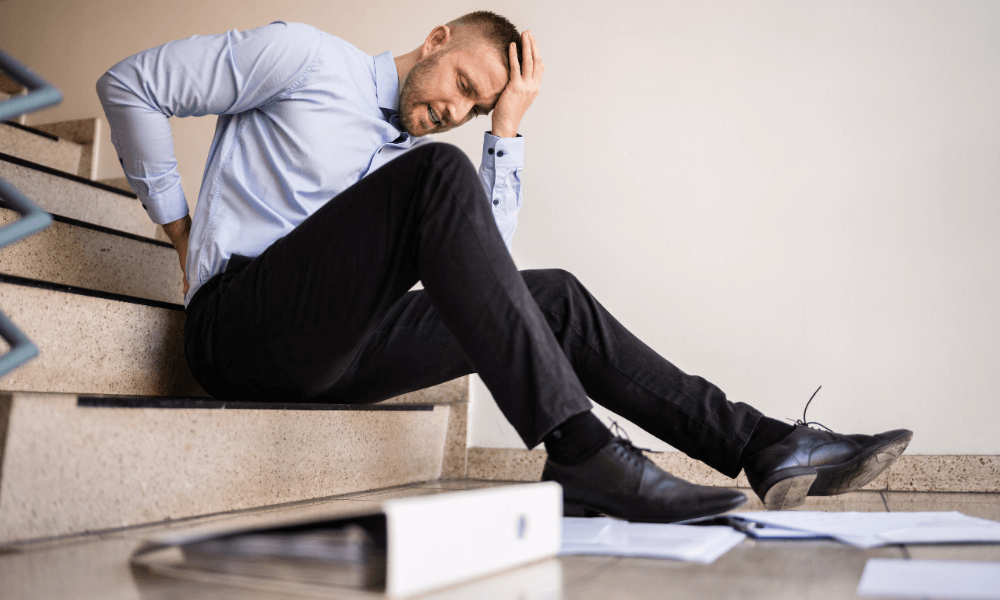Defending Slip and Fall Claims


Key Takeaways:
- Even when businesses proactively put safety mechanisms in place to prevent personal injury, people continue to file slip-and-fall claims.
- If someone slips and falls on your property, you may be held fully or partially responsible.
- In some cases, the injured party may be held fully or partially responsible for an injury.
- West Virginia’s comparative negligence law determines the plaintiff and defendant’s level of fault in an accident.
- A knowledgeable West Virginia attorney can assist your company by building a defense and advising you on how to limit future premises liability risks.
According to the National Safety Council, more than 6.9 million Americans were treated in the emergency room for falls in 2021. Unfortunately, many business owners routinely face lawsuits from these falls after the injured party claims the company’s negligence led to them slipping or falling.
Most businesses take reasonable steps to protect people who are on their properties. Yet, for years, personal injury lawyers have initiated frivolous claims against West Virginia businesses, forcing companies to spend time and money defending themselves.
We believe your company deserves a strong defense against premises liability claims. Learn about the different defenses to slip-and-fall claims in West Virginia and how Orndorff Mowen PLLC works hard to protect your business. Contact us today at 866-481-2765 to schedule a consultation.
Am I Liable if Someone Slips and Falls on My Property in West Virginia?
In West Virginia, property owners are responsible for safely maintaining their properties. This includes proactive maintenance and correcting obvious dangers in a timely fashion, such as:
- Wet floors (always put up warning signs until it dries)
- Broken handrails
- Broken stairs
- Icy sidewalks
- Any other hazards that could lead to a slip or fall
If you knew about or reasonably should have known about a hazard on your West Virginia property and did not take reasonable care, you may be found negligent. For instance, if you see ice on your walkway and fail to treat it, leaving unsafe conditions, you may be held responsible for a visitor’s slip-and-fall accident. If they are hurt after falling, they can file an injury claim against you.
With that being said, in some cases, a visitor might not be able to hold a business liable after sustaining an injury.
A slip-and-fall claimant cannot hold you responsible if they:
- Did not avoid obvious hazards to prevent injury to themselves
- Cannot prove you, as the defendant, owed them a duty of care
- Were trespassing on your property
- Are unable to prove their injury is connected to your failure to uphold a duty of care
- Cannot prove harm occurred from the slip-and-fall
Lastly, the visitor must prove your negligence substantially contributed to their injuries. If they cannot demonstrate fault, you likely will not be held responsible.
Additionally, plaintiffs or their designated personal injury attorney must file a claim before West Virginia’s two-year statute of limitations expires.
What is the Comparative Fault Defense?
West Virginia follows a modified comparative fault rule. This means if the plaintiff is 51% or more responsible for the accident, they are ineligible to pursue compensation from the other party. This rule prevents people from obtaining payouts from an insurance company when they expose themselves to a dangerous condition and cause an accident that was mostly their own fault.
How Does the Comparative Fault Defense Impact a West Virginia Slip-and-Fall Case?
In West Virginia premises liability cases involving alleged fall injuries, property owners can argue comparative fault defenses to win their case or otherwise reduce damages owed. In a comparative fault state, how much the injured party is at fault for the accident should factor into settlement discussions and would factor into a verdict at trial.
Common Defenses in a Slip-and-Fall Accident

If an individual slips and falls on your property, causing injury, you may be able to refute their claims by using the following defensive strategies.
Assumption of Risk
An assumption of risk strategy is utilized if the plaintiff should have known that entering the property involved risk. The defense can argue the injured party knew the risks but still knowingly and/or voluntarily exposed themselves to known dangers.
Open and Obvious
The open and obvious defense can be used if an injury occurs from a hazard that would have been clear to a reasonable person. While owners have a duty of care to protect visitors from injury, visitors also have a duty of care to avoid obvious hazards. This strategy is not applicable if the dangerous condition is related to negligence, such as a building code violation.
West Virginia Open and Obvious Code: §55-7-28
Lack of Notice
Defendants may be able to argue lack of notice of a premises injury claim by claiming they did not have sufficient knowledge of any dangerous conditions found on their property. In other words, the plaintiff is unable to sufficiently prove one or more of the following:
- When the hazard arose
- How long the hazard existed
- That the owner knew of the hazard
If the property owner did not have reasonable notice of the issue, they may be able to win a summary judgment or move for a case dismissal.
Reasonable Care
Businesses can build a reasonable care defense if they can demonstrate they did everything reasonable to prevent an accident from occurring. Since the plaintiff must prove the defendant’s efforts did not meet accepted standards of care, if the defendant can show they did exhibit reasonable care, this could be an effective defensive strategy.
Why Work With Orndorff Mowen PLLC
At Orndorff Mowen PLLC, we pride ourselves on the relationships we build with our clients. When you come to us for your legal needs, our lawyers will work closely with you to represent and defend your business. With decades of litigation experience, our lawyers are prepared to provide you with legal services that get results.
Frequently Asked Questions About Slip-and-Fall Defenses
Businesses seeking to defend themselves against premises liability claims often have many questions. In this section, we answer many of the frequently asked questions we encounter.
What Evidence Can I Use to Defend Against a Slip-and-Fall Claim in West Virginia?
To defend your company against a slip-and-fall case, you may be able to present evidence to demonstrate the plaintiff had all or at least some portion of the blame for their accident, examples including:
- Camera footage or photographs to refute claims
- Eyewitnesses who can attest you reasonably took care of the property
- Documentation that another party was responsible (e.g., you rent a property to another business that was negligent)
- Demonstrations that the hazard was not obvious and there was no way you knew about it
- Documentation you properly maintained the area of the property where the plaintiff claims they were hurt
- Evidence (e.g., receipts) you adhered to a regular schedule for inspections of your property
How Can I Reduce the Risk of Slip-and-Fall Accidents on My Property?
To avoid being found responsible for slip-and-fall accidents on your property, you may be able to implement numerous prevention measures.
- Immediately clean up spills or apply treatment to icy areas.
- Install warning signs for wet floor areas.
- Eliminate trip hazards on floors, walkways, stairs, and doorways.
- Ensure handrails are installed and in good working condition.
- Make sure both interior and exterior lighting are adequate.
- Add slip-resistant surfaces in high-risk areas.
Does Orndorff Mowen Advise Companies on How to Limit Their Premises Liability Risks?
Yes, our attorneys can advise clients on risk-reduction strategies. Stressing the documentation of incidents at the outset is key, as this tends to be overlooked by a company’s employees, especially in the context of retail. For significant injuries, a company or premises may want to immediately involve counsel to avoid inadvertently missing crucial steps.
Don’t Let Your Defense Slip Through the Cracks
Businesses are frequently named as defendants in personal injury cases, especially for slips and falls. At Orndorff Mowen PLLC, we are well-versed in West Virginia laws and can help you build a strong defense against an injury claim.
Contact our premises liability attorneys at 866-481-2765 to schedule a consultation. If preferable, you can fill out our online contact form and a member of our team will get back to you.
"*" indicates required fields

